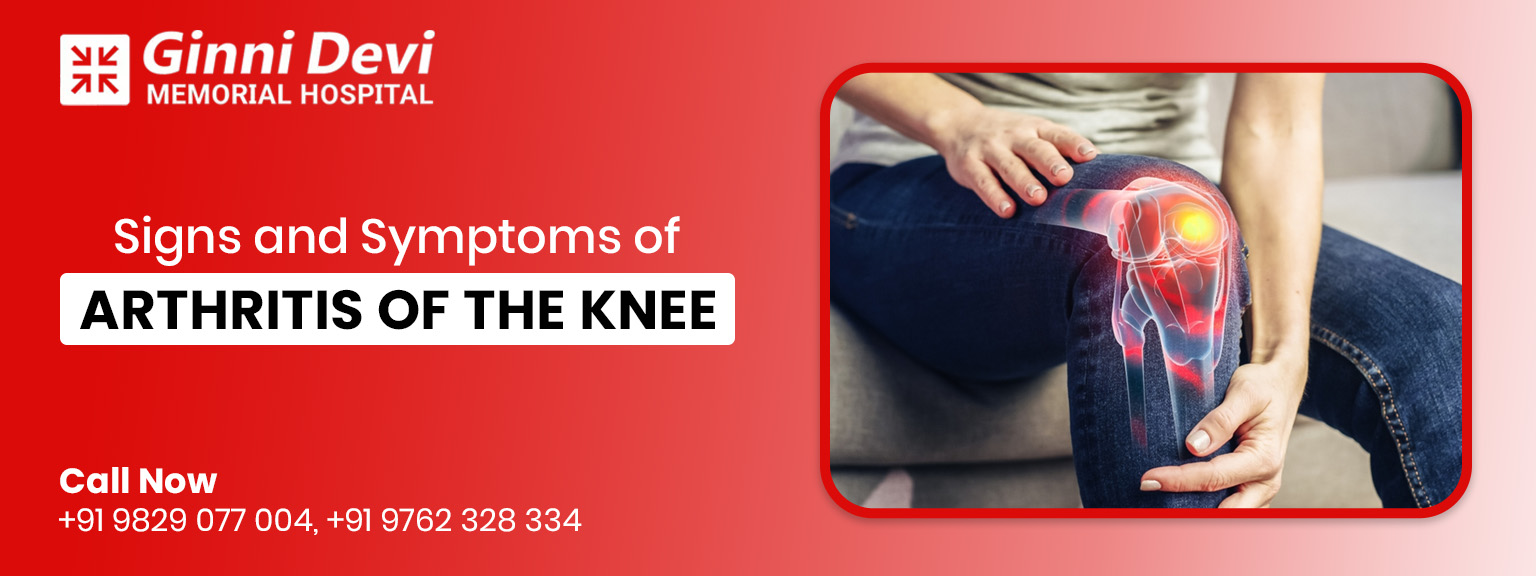Arthritis of the knee is a common condition that affects millions of people worldwide. It occurs when the cartilage in the knee joint deteriorates, leading to pain, swelling, and decreased mobility. If you’re experiencing discomfort in your knees, it’s crucial to understand the signs and symptoms of knee arthritis to seek appropriate treatment and improve your quality of life.
In this blog, we’ll explore the symptoms of knee arthritis and how to get the right care in Jaipur.
Common Symptoms of Arthritis of the Knee
Persistent Pain
One of the most noticeable symptoms of knee arthritis is persistent pain. This pain often worsens with activity and may improve with rest. You might feel aching or throbbing sensations that are often localized around the knee joint.
Stiffness
Stiffness in the knee, especially in the morning or after sitting for extended periods, is a hallmark of arthritis. This stiffness can make it challenging to bend or straighten the knee fully.
Swelling
Swelling around the knee joint is a common symptom of arthritis. It may occur due to inflammation of the tissues around the joint or fluid buildup. Swollen knees may feel warm to the touch and can be visibly puffy.
Reduced Range of Motion
Arthritis can limit the range of motion in your knee joint. You might find it difficult to perform daily activities such as climbing stairs, squatting, or walking without discomfort.
Grinding or Clicking Sensation
You may experience a grinding or clicking sensation when moving your knee. This sound is often due to the rough surfaces of the joint rubbing against each other as the cartilage wears away.
Weakness or Instability
The knee joint may feel weak or unstable, making it challenging to support your body weight. This weakness can increase the risk of falls and injuries.
Joint Deformity
In advanced cases of arthritis, the knee joint may become deformed. This deformity can result in changes in the alignment of the leg or noticeable bulging around the joint.
Pain During Rest
Although arthritis pain is typically worse with activity, it can also cause discomfort during rest or sleep. This pain can disturb your sleep and affect your overall well-being.
Diagnosing Arthritis of the Knee
If you experience any of these symptoms, it’s essential to consult a healthcare professional for an accurate diagnosis. Your doctor will likely perform a physical examination and may recommend imaging tests, such as X-rays or MRI scans, to assess the extent of cartilage loss and other joint changes.
Treatment Options for Knee Arthritis
The treatment for knee arthritis aims to reduce pain, improve function, and prevent further joint damage. Your doctor may recommend a combination of the following approaches: medications, physical therapy, lifestyle modifications, and in some cases, minimally invasive procedures like arthroscopy. For specialised care, Dr. Pratul Jain at Ginni Devi Hospital is renowned for providing expert treatment as part of a leading Knee Arthroscopy Hospital in Jaipur, offering advanced diagnostics and surgical solutions tailored to each patient’s needs.
Medications
Over-the-counter pain relievers and anti-inflammatory medications can help manage symptoms. In some cases, your doctor might prescribe stronger medications or corticosteroid injections to reduce inflammation.
Physical Therapy
Physical therapy can strengthen the muscles around the knee, improve flexibility, and enhance overall joint function. Your physical therapist will design a personalized exercise program to address your specific needs.
Lifestyle Modifications
Maintaining a healthy weight is crucial for managing knee arthritis, as excess weight puts additional stress on the joint. Incorporating low-impact exercises, such as swimming or cycling, can also be beneficial.
Assistive Devices
Using knee braces, canes, or shoe inserts can help provide additional support and alleviate stress on the joint.
Surgical Options
If conservative treatments are not effective, surgical options may be considered. Procedures such as arthroscopy, osteotomy, or knee replacement can help relieve pain and restore function.
Get Knee Arthritis Treatment in Jaipur at Ginni Devi Orthopedic Hospital
If you’re struggling with symptoms of arthritis of the knee, Ginni Devi Best Orthopedic Hospital in Jaipur offers comprehensive knee arthritis treatment. Our experienced orthopedic specialists are dedicated to providing personalised care to help you manage your condition and improve your quality of life.
At Ginni Devi Orthopedic Hospital, we understand the impact that knee arthritis can have on your daily life. Our team of experts will work with you to develop a tailored treatment plan that addresses your specific needs and goals. Don’t let knee arthritis hold you back—reach out to us today to start your journey towards better joint health and pain relief.
Conclusion
Understanding the signs and symptoms of arthritis of the knee is the first step towards managing the condition effectively. Persistent pain, stiffness, swelling, and reduced range of motion are common indicators that you may be experiencing knee arthritis. By seeking timely medical advice and exploring available treatment options, you can improve your quality of life and regain mobility. For expert care and personalised treatment in Jaipur, contact Ginni Devi Orthopedic Hospital and take control of your knee health today.
FAQ on Knee Arthritis
1. What is knee arthritis, and how does it affect my daily life?
Knee arthritis is a condition where the cartilage in your knee joint wears down over time, leading to pain, stiffness, and swelling. This can make everyday activities like walking, climbing stairs, or even sitting for long periods challenging. The discomfort and reduced mobility can affect your quality of life, making it important to manage symptoms and maintain a healthy lifestyle.
2. What are the common symptoms of knee arthritis I should watch out for?
Common symptoms of knee arthritis include persistent knee pain, especially during or after activity, stiffness in the joint (particularly in the morning or after resting), swelling, and a decreased range of motion. You might also notice a crunching or popping sound when moving your knee. If you experience these symptoms frequently, it’s crucial to consult a healthcare provider for an accurate diagnosis and treatment plan.
3. How can I manage knee arthritis pain without surgery?
There are several non-surgical options to manage knee arthritis pain. These include physical therapy to strengthen the muscles around the knee, regular low-impact exercises like swimming or cycling, and weight management to reduce stress on the joint. Additionally, over-the-counter pain relievers, hot or cold packs, and knee braces can help alleviate symptoms. Always discuss these options with your doctor to create a personalized management plan.
4. What lifestyle changes can help improve my knee arthritis symptoms?
Making certain lifestyle changes can have a significant impact on knee arthritis symptoms. Maintaining a healthy weight is crucial, as excess weight puts additional stress on your knees. Regular, low-impact exercise can help keep your joints flexible and strengthen the supporting muscles. Eating a balanced diet rich in anti-inflammatory foods like omega-3 fatty acids and antioxidants may also provide relief. Always consult your doctor before making any major changes to your routine.
5. When should I consider surgical options for knee arthritis?
Surgical options might be considered if non-surgical treatments are no longer effective in managing your symptoms or if your arthritis is significantly affecting your daily life and mobility. Common surgical procedures for knee arthritis include arthroscopy to clean out the joint, osteotomy to realign the knee, or total knee replacement. Your doctor will evaluate your condition and discuss the best approach based on your specific needs and overall health.





